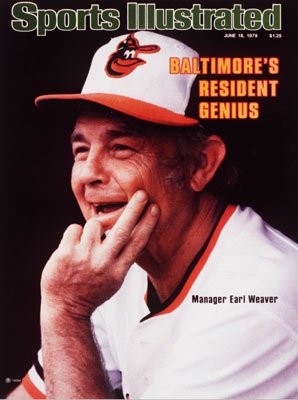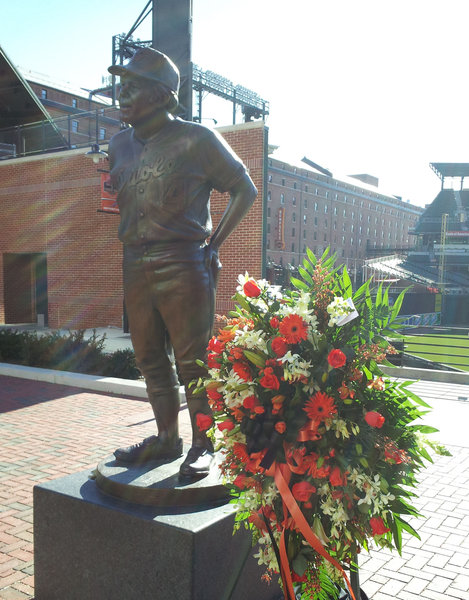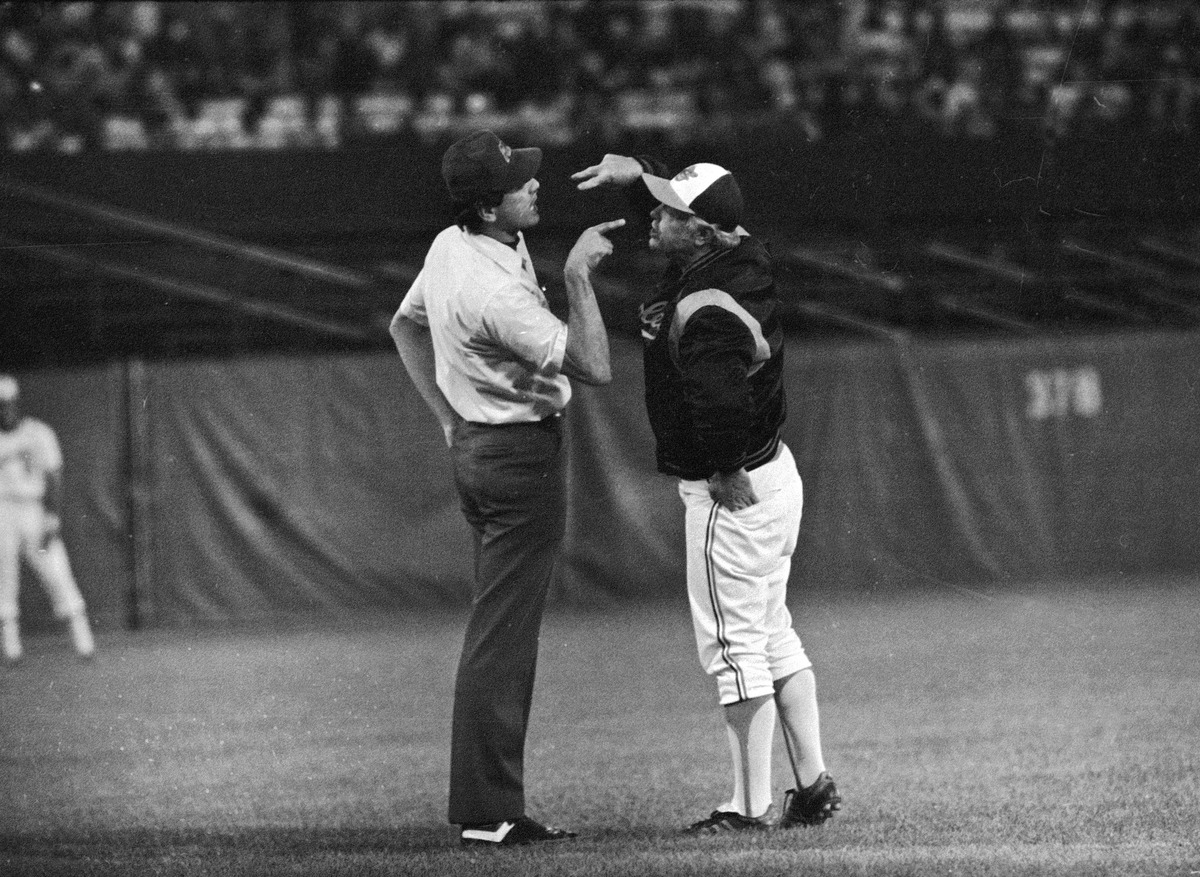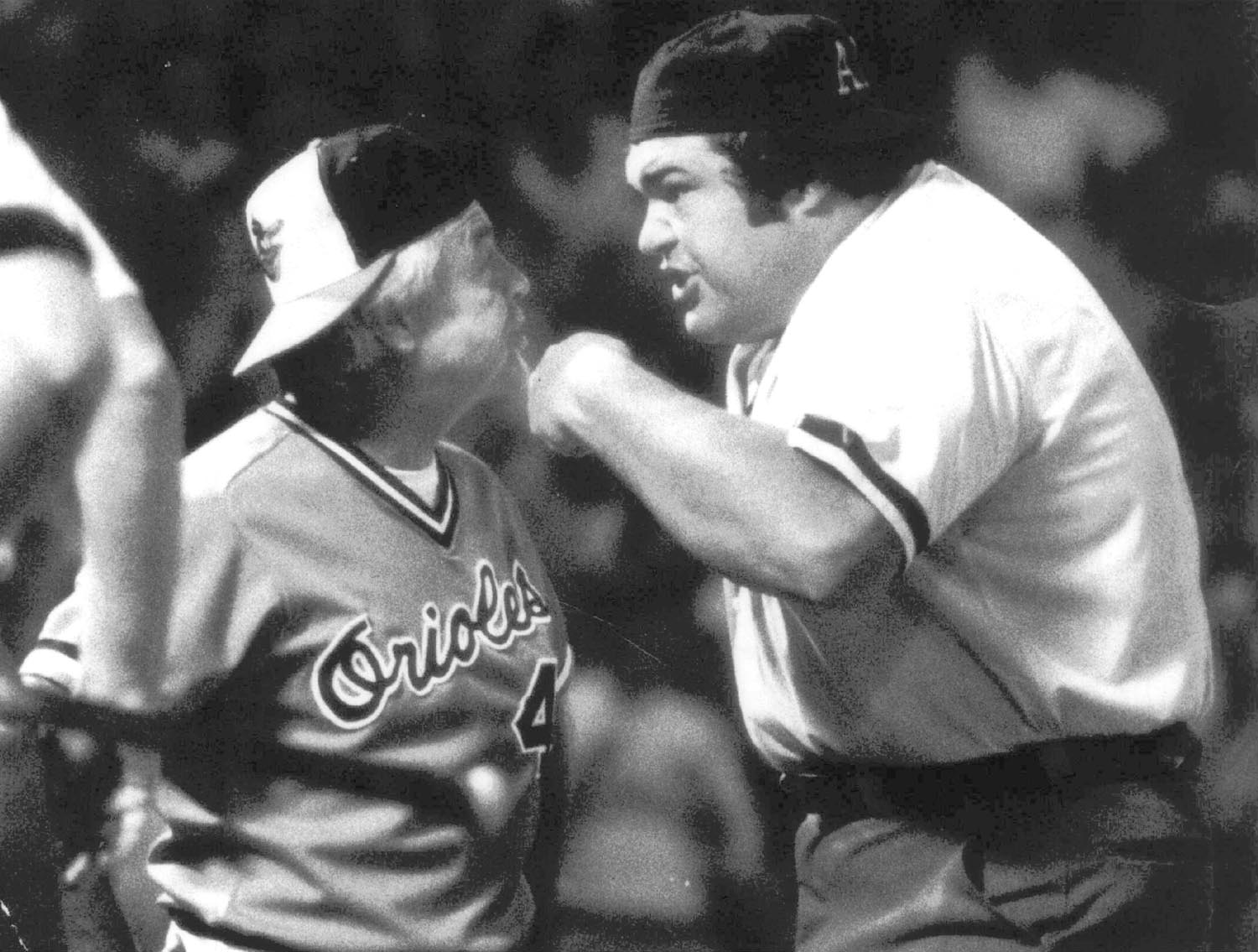THE EARL OF BALTIMORE STANDS ALONE

 Many things are good and bad about getting older. However losing parts of your childhood sits at top of the list about the things that are bad about the aging process.
Many things are good and bad about getting older. However losing parts of your childhood sits at top of the list about the things that are bad about the aging process.
When it was announced early Saturday morning that former Orioles Hall of Fame Manager Earl Weaver passed away late Friday night while on a baseball-themed cruise, all I could think of was the many trips to Memorial Stadium with my father to watch Weaver guide baseball’s winingest franchise at the time.
If the Baltimore Orioles had a Mission statement hanging in the clubhouse from 1968 through 1985 it undoubtedly read, The Oriole Way is Perfect Practice Makes Perfect and “Pitching, Defense, and the Three-Run Home Run” win games.
It may not have been hanging on the wall but that philosophy is what “The Earl of Baltimore” forged into the hearts, minds and soul of every Orioles player that wore the black and orange during those eras.
The 5-foot-7 chain-smoking Weaver, who could at times be seen puffing on a Raleigh cigarette in the corner of O’s dugout during close games, was 82. The “Little Genius” as he was also known managed his beloved Orioles for a combined 16 seasons. His first bout, the longest was from 1968 to 1982, and again in 1985-86.
During Weavers days in Baltimore, the Orioles were the envy of baseball as No.4’s Birds, not the Yankees, Dodgers or Red Sox, were the winingest franchise in the sport. His teams won 1,480 games and lost 1,060, and his lifetime winning percentage (.583) ranks seventh all-time and fifth among managers in the modern era who managed 10 years or more.
Five times, the Orioles won at least 100 games and from 1969 through 1971, his teams averaged 106 wins, wining not less than 101 games during that span. What made Weaver such a genius in the dugout was his penchant for not wasting an out. He hated to bunt, once telling reporters “You only get 27 of them, why would you give one away”.
Baseball is and has always been a game of numbers. Weaver played the percentages while mixing in his memory of strategy and baseball knowledge. He treated each out as if it were the last and had a scouting report on every player in his head and on index cards he carried in his back pocket.
He was not very good as an actual player. Born and raised in St. Louis, Weaver signed with the Cardinals in 1948 and toured the minor leagues as a Mark Belanger type hitting second baseman. In 1957, at age 26, he joined the Orioles’ organization as player-manager of their Fitzgerald, Ga. rookie club, and began his move to the dugout inn Baltimore. He quit playing in 1960, never having made the big leagues.
He paid his dues in the minors, managing for 11 seasons. He was a winner, as Weaver won three pennants, placed second on five occasions and never finished out of the first division in the lower level.
Weaver came to Baltimore as a first-base coach in 1968, and after the Orioles started that season 43-37, manager Hank Bauer was fired. Weaver made his managerial debut on July 11, 1968. Behind a two hit gem from starter Dave McNally, the Orioles defeated the Washington Senators, 2-0, earning Weaver his first win as a manager.
The Orioles would win 48 of the remaining 82 games finish the season 91-71, in second place 12 games behind the eventual World Series champion Detroit Tigers. For the next 13 seasons, the Orioles would average 96 wins per season. The Birds would capture the A.L East six times and the American three. They would struggle in the World Series winning just once in three straight trips from 1969 to 1971.
Their only World Series title under Weaver occurred in 1970 when Baltimore defeated a young Big Red Machine in five games. The O’s series victory over the Cincinnati Reds is a series that is remembered for the legendary performance of third baseman Brooks Robinson and his “Human Vacuum” like fielding at the hot corner, which led to a series MVP award for No.5.
Weaver was fortunate to have one of the best development systems in all of baseball. Weavers’ teams never lacked talent, which the Orioles grew on the farm and complimented with the occasional Milt Pappas for Frank Robinson trade. During Weavers tenure in Baltimore, award hardware was handed out like water bottles.
Starting with Frank Robinson in 1966, three different Orioles were named Most Valuable Player. Power hitting first baseman Boog Powell won the prize in 1970 and although not during Weavers tenure per say, Cal Ripken Jr. won it in 1983
Four Oriole pitchers combined for six Cy Young Awards (Mike Cuellar in 1969, Jim Palmer in 1973, 1975, and 1976, Mike Flanagan in 1979, and Steve Stone in 1980), and three players were named Rookie of the Year (Al Bumbry in 1973, Eddie Murray in 1977, and Cal Ripken, Jr. in 1982).
Baltimore’s minor league system, led by Cal Ripken Sr. produced young star after young star. Senior believed in the “Perfect Practice Makes Perfect” philosophy and along with Weavers knowledge and fiery personality, help create the “Oriole Way”.
The Oriole Way was a belief that hard work, professionalism, and a strong understanding of fundamentals were the keys to success at the major league level. It was based on the belief that if every coach, at every level, taught the game the same way, the organization could produce “replacement parts” that could be substituted seamlessly into the big league club with little or no adjustment.
This helped fuel the notion that Weaver was a push button manager of a well-oiled machine.
Weaver never wasted talent and was afraid to take chances if what he believed was correct. Weaver’s moves still have an effect on today’s game. He is credited with moving Cal Ripken Jr. from third base to shortstop when players with Ripken’s size were not considered shortstops.
Ripken didn’t fit the “good hit/no field little guy” stereotype of a shortstop prevalent at the time, and Weaver’s successful move helped to paved the way for future generations of large power hitting shortstops like Alex Rodriquez and Derek Jeter.
Weaver may have looked old school but he was far from it. He welcomed any advantage and sought them out. As a proponent of the walk and the three-run homer and a hater of the sacrifice bunt, Weaver’s teams played “Moneyball” long before it was fashionable. His teams consistently ranked near the top of the league in walks and on base percentage. In fact, during 1975 spring training in Miami, Florida, Earl Weaver pioneered the use of radar guns in professional baseball to track the speed of pitches.
Weaver retired in 1982 in dramatic fashion. His Orioles trailed the Milwaukee Brewers by three games with four to play on the season’s final weekend. As they always seemed to do with Weaver at the helm, the Birds produced some Orioles magic, with the help of Weavers genius and managed to tie the Brewers for the division making the series finale a winner take all.
Unfortunately, there was no magic that afternoon as Don Sutton beat Jim Palmer and Weavers team 10-2 for the division championship. The Orioles may have lost the game but Weaver won the hearts of a nation.
Despite losing to the Brewers, that day is one of the greatest in Orioles baseball history. Twenty minutes after the game, 40,000 fans hollered him back onto the field, where Weaver turned to the crowd and, arms extended, spelled O-R-I-O-L-E-S as fans shouted it out.
Who will ever forget Howard Cosell telling a national television audience as Weaver cried at home plate waving to the Memorial Stadium crowd, how special Weaver was to Baltimore and baseball. The Orioles retired Weaver’s No. 4 jersey, making him only the second big league manager to have his number retired (after Casey Stengel of the New York Yankees).
Two and a half years later, at the request of Orioles owner Edward Bennett Williams, Weaver returned in mid-1985 after the firing of Joe Altobelli. The Birds finished fourth as Weaver managed them down the stretch, winning 53 and losing 52.
This was an odd time, as somehow the game appeared to have passed Weaver by. Actually looking back, Weaver seemed disengaged on most nights during his second stint and lacked the fire that followed him the first time around. He retired for good after 1986, when the Orioles (73-89) finished seventh in the AL East. It was the only losing season in Weaver’s 17 years with the club.
 Of course, no Earl Weaver article would be complete without talking about his disagreements with umpires and his ejections from games during his career. His Napoleon complex was at its best when in the face of a blue shirt arguing a call.
Of course, no Earl Weaver article would be complete without talking about his disagreements with umpires and his ejections from games during his career. His Napoleon complex was at its best when in the face of a blue shirt arguing a call.
Weaver was tossed from games in every conceivable fashion at even before they started. He was once tossed for smoking a cigarette in the dugout. When Weaver delivered the lineup the next game with a candy cigarette in his mouth, he was tossed again.
Despite his penchant for being ejected, Weaver is not the career leader in that category. Former Braves Bobby Cox holds the major league record with 158, followed by John McGraw with 131 and Leo Durocher with 124. Weaver’s 98 ejections are an American League record. No.4 was even once thrown out of both games of a double header. Now that’s persistence.
Former umpire Don Denkinger said he called one of Weaver’s last games in the majors.
“He comes to home plate before the game and says, `Gentlemen, I’m done.’ He told us the only way he’d ever come back is if he ran out of money,” Denkinger told The Associated Press by phone from Arizona. “I told him that if he ever ran out of money to call the umpires’ association and we’d take up a collection for him. We’d do anything, just to keep him off the field and away from us.”
Umpires found out just how demonstrative the “Little Man” could be. Denkinger remembered a game in which the manager disputed a call with Larry McCoy at the plate.
“Earl tells us, `Now I’m gonna show you how stupid you all are.’ Earl goes down to first base and ejects the first base umpire. Then he goes to second base and ejects the second base umpire. I’m working third base and now he comes down and ejects me,” Denkinger said.
Much later, after they were retired, the umpire asked Weaver to sign a photo of that episode.
“He said absolutely. I sent it to him, he signed it and said some really nice things. It’s framed and hanging up in my office back home in Iowa,” Denkinger said.
Umpires also knew Weaver had a plan, and getting thrown out was sometimes a calculated risk Weaver took to protect his players or fire them up. Weaver’s theatrics were well-planned, said Rich Garcia, former AL umpire.
“He knew the drill. Earl didn’t want his players thrown out [for beefs], so he stepped in and got thrown out himself,” Garcia said.
“In my eyes, he was an icon of the game, and some of his strategies helped umpires. Earl did not want his pitchers throwing at guys because he didn’t want other teams doing the same. He didn’t want anyone getting hurt because he felt his 25 guys could beat anyone else’s.”
Of course, former players are chiming in with their thoughts on their former manager.
“Earl was such a big part of Orioles baseball and personally he was a very important part of my life and career and a great friend to our family,” Hall of Fame shortstop Cal Ripken said. “His passion for the game and the fire with which he managed will always be remembered by baseball fans everywhere and certainly by all of us who had the great opportunity to play for him. Earl will be missed but he can’t and won’t be forgotten.”
This man fought for me,” Murray, a Hall of Famer, said in 2003. “He kept telling [general manager] Hank Peters and the rest of the front office, that I should stay. They just had me penciled in there, but he kept sending me out [on the field].”
You could go toe-to-toe, face-to-face and cheek-to-cheek with [Weaver],” former Oriole outfielder Don Buford said. “No matter what happened, the next day it was forgotten. That was outstanding.”
Weavers’ death occurred on the eve of the teams annual fan fest. Many fans are obviously paying their respects and now have a great place to do it. This past summer, the Orioles began to honor their past by unveiling statues of past Orioles greats. The Legends series was born, as a statue for each Orioles Hall of Fame member was unveiled during a ceremony. Each of them now stands in the courtyard just outside the parks entrance. Flowers are being placed at the base of Weavers this weekend.
The three-time manager of the year was inducted into the Baseball Hall of Fame in 1996.
In 1998, he suffered a heart attack while watching television at his home in Florida and quit smoking after that. Weaver is survived by Marianna, his wife of 49 years, of Pembroke Pines, Fla.; a son, Michael Weaver, of Fort Lauderdale, Fl.; and daughters Kim Benson, of Bel Air, Terry Leahy, of St. Louis, and Rhonda Harms, of Houston.
Weavers’ death is not the only passing baseball is mourning today. Saturday began with news of Weaver’s death and by the end of the night; Stan “The Man” Musial had died, too, leaving baseball to reflect on two distinguished careers rich in contrasts.
Musial won seven National League batting crowns, was a three-time MVP and helped the Cardinals capture three World Series championships in the 1940s.
He spent his entire 22-year career with the Cardinals and made the All-Star team 24 times — baseball held two All-Star games each summer for a few seasons. He had been the longest-tenured living Hall of Famer.
According to the Baltimore Sun, Weaver wrote his own epitaph, Weaver once said on my tombstone write, The Sorest loser to ever live”. Weaver hated to lose and that is what made him so great, that burning desire that not everyone has. Today, we are all losers as both Weaver and Musial have moved on.
I do feel very lucky to have grown up in Baltimore and learning how to play baseball watching my beloved Orioles, managed by The Earl of Baltimore. Rest in Peace Earl Weaver, in peace!

